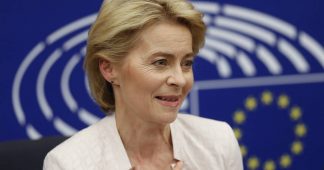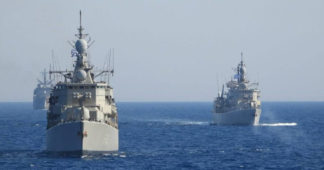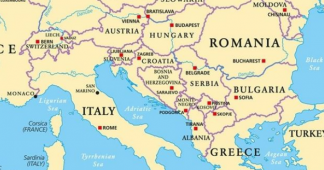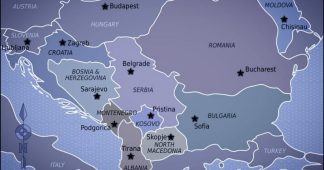By Alice Taylor
Jun 29, 2022
Countries in the EU waiting room such as Albania, North Macedonia, Montenegro and Serbia have mainly failed to register any real progress in reducing corruption and improving democracy over the last four years, fundamental pre-requisites for EU accession.
The plight of the Western Balkan countries was in the spotlight at the recent EU-Western Balkan summit in Brussels. Angry regional leaders took to the stage to point fingers at the EU, its lack of unity, unfulfilled promises, and even accused the EU of not having its own house in order.
While some of their frustrations were justified, EURACTIV wanted to take a closer look to see just how far they have progressed in the last few years in terms of their own housekeeping.
The results are far from impressive.
Albania applied for membership in 2009 and became an official candidate in 2014. Since then, it has worked to fulfil a number of conditions laid down by the Commission. These conditions, 15 in total, have been declared completed by Brussels, but independent organisations would beg to differ.
Transparency International’s corruption perception index has dropped significantly between 2016 and 2021, falling from 39 to 35 points out of a possible 100.
It is currently at 2014 levels and has barely improved from 2012 when the country was first included. This shows little progress in a decade, and particular issues raised repeatedly over the years include state capture, police violence, high-level corruption, and weak checks and balances.
Moving to the Freedom House Freedom in the World Index, it is a similar story. Albania has fallen over the last five years, there has been no progress, and it is still ranked as “partly free” regarding freedoms and democracy enjoyed by citizens.
Things get even worse when we look at the media freedom landscape as the country has plummeted more than 20 places down the global ranking since Prime Minister Edi Rama came to power in 2013.
Even the US State Department has been consistent in its scathing criticisms of human rights abuses, a heavily corrupt judicial system, failure to quell human trafficking, drug cultivation and organised crime, and no progress in combating corruption or money laundering.
The picture is a bit rosier in North Macedonia, which has been on the bloc’s waiting list for some 17 years. With its accession path tied to neighbouring Albania, its progress has been more tangible.
Both Freedom House and Reporters Without Borders report progress yearly from the country, albeit with the odd hiccup. The media environment, while still fragmented and plagued by political pressure and disinformation, is getting better.
Democratic freedoms are also increasing, with the country reaching an all-time high score of 67 out of 100 last year, although it is yet to shrug off the “partly free” status.
While it does have its problems, North Macedonia often out-performs its neighbours in terms of asylum seekers in Europe, organised crime, and drug trafficking incidence.
Montenegro, one of only two regional countries to open accession talks, has also done better than expected. The current pace of negotiations is slow, and at this rate, the country could hope to join the bloc in around 90 years. That said, there is progress in some areas.
Transparency International observed a minor increase from 2018, just one point in 2021. However, the overall picture had improved from 2014 when it reached a low of 42, four points worse than today’s score.
It is also improving in terms of democratic and societal freedoms, jumping from 65 in 2019, down to 62 in 2020 and up to 67 in 2021. While it is still ranked as partly free, progress appears to be underway, even in the media freedom environment, as it ranked 63 in 2021, up from 104 the previous year.
However, journalist Jovo Martinovic said there is no real political will to combat corruption, and the weakness of the judicial system means there is little in the way of accountability.
“Montenegro is incapable of advancing accession talks with the EU….The core problem is corruption and a hardly functioning judiciary which is worse than in Albania. Corruption is impossible to deal with here,” he told EURACTIV.
Serbia is the worst performer in the region, even more so than Albania. Transparency International reported that since 2016 when it scored 42 points, it has been on a downwards trajectory, getting more corrupt and scoring just 38 last year.
This is compounded by a decrease in democratic freedoms since the party of President Aleksander Vucic came to power. The country, negotiating accession and recently opened a new chapter, fell from free to partly free in recent years instead of registering an improvement.
The US State Department also didn’t hold back. They have levied significant criticism in recent years over a lack of media diversity, state capture, significant human rights abuses, numerous serious acts of government corruption, and crimes targeting the LGBTI community and those with disabilities.
Many crimes against these people, as well as other members of society such as women, civil society, and society as a whole, went unpunished.
Kosovo and Bosnia and Herzegovina are yet to be granted candidate status, with the former yet to enjoy visa liberalisation. Among their neighbours, Kosovo has registered a significant increase across all areas in the last few years, often ranking above its EU hopeful counterparts.
The European Commission admits more needs to be done for rule of law reforms in the Western Balkans following a European Court of Auditors report which deemed the €700 million of EU work “ineffective” and “not successful”.
Overall, the situation for corruption, organised crime, media freedom, democracy, human rights, and other political matters is not bright in the Western Balkans. Despite hundreds of millions ploughed into hopeful countries by the European Commission, independent organisations report backsliding rather than progress.
This leads to questions over the effectiveness of the money invested, as noted by the European Court of Auditors, as well as the trajectory of their EU path.
We remind our readers that publication of articles on our site does not mean that we agree with what is written. Our policy is to publish anything which we consider of interest, so as to assist our readers in forming their opinions. Sometimes we even publish articles with which we totally disagree, since we believe it is important for our readers to be informed on as wide a spectrum of views as possible.










